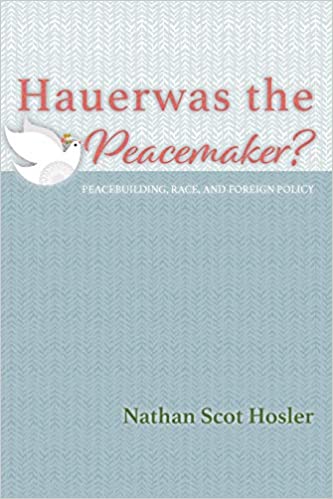 | Hauerwas the Peacemaker?: Peacebuilding, Race, and Foreign Policy by Nathan Scot Hosler Pickwick Publications (April 14, 2020). 290 pages. “War has been abolished in Christ” is a strong claim by theologian Stanley Hauerwas. Wars, however, continue to rage, and historic numbers of people are displaced globally. Despite critics’ assessments that Hauerwas contributes to Christians disengaging, his work provides certain tools for the work of peacebuilding. In this work, Hauerwas’s contribution to peacemaking as a part of his ecclesiology and broader theological/ethical work will be assessed. Hauerwas’s peacemaking within his work stands within the context of ecclesiology and related themes of witness and Christology. The possibilities of his work on peacemaking to extend to peacebuilding practice and foreign policy formation are explored, and a critique is leveled regarding his engagement with racial justice. Additionally, certain practices of reading in theology and training in this language are extrapolated to engage the task of policy formation and analysis in contexts where religion is an active factor. This study concludes that Hauerwas’s theological ethics of peacemaking makes a valuable contribution, but must be extended into specific practices. |
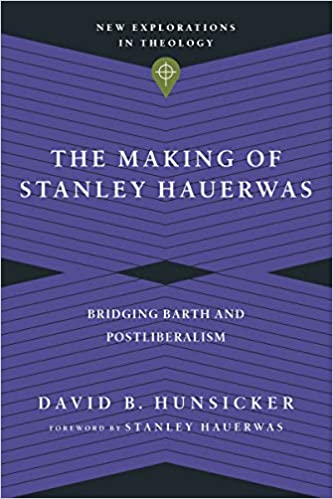 | The Making of Stanley Hauerwas: Bridging Barth and Postliberalism (New Explorations in Theology) by David B. Hunsicker (Author), Stanley Hauerwas (Foreword). IVP Academic (September 10, 2019). 248 pages. In the past half-century, few theologians have shaped the landscape of American belief and practice as much as Stanley Hauerwas. His work in social ethics, political theology, and ecclesiology has had a tremendous influence on the church and society. But have we understood Hauerwas's theology, his influences, and his place among the theologians correctly? Hauerwas is often associated―and rightly so―with the postliberal theological movement and its emphasis on a narrative interpretation of Scripture. Yet he also claims to stand within the theological tradition of Karl Barth, who strongly affirmed the priority of Jesus Christ in all matters and famously rejected Protestant liberalism. These are two rivers that seem to flow in different directions. In this volume within IVP Academic's New Explorations in Theology (NET) series, theologian David Hunsicker offers a reevaluation of Hauerwas's theology, arguing that he is both a postliberal and a Barthian theologian. In so doing, Hunsicker helps us to understand better both the formation and the ongoing significance of one of America's great theologians. |
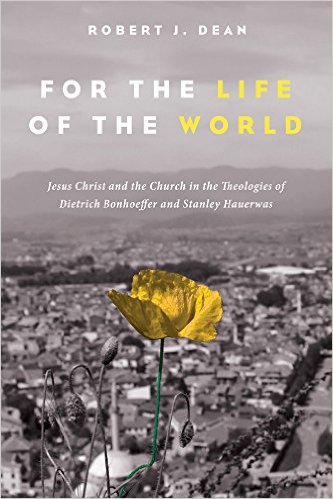 | The Church in a Secular Age: A Pneumatological Reconstruction of Stanley Hauerwas’s Ecclesiology by Silje Kvamme Bjørndal (Author), Amos Yong (Foreword) Pickwick Publications (September 20, 2018) 232 pages. How can the church navigate the challenges of our secular age? In The Church in a Secular Age, Norwegian and Pentecostal scholar Silje Kvamme Bjørndal takes on three dynamic thinkers, each in their own way, in search for insights to this question. Philosopher Charles Taylor offers the backdrop for the conversation, as Bjørndal carefully sifts out some of his most central tenets for understanding our secular age. Bjørndal then turns to the theologian and ethicist Stanley Hauerwas and critically engages his notion of the church as a community set apart from our secular age. By bringing several of Hauerwas’s interlocutors into the conversation, Bjørndal manages to bring out both the acute relevance and the shortcomings of his ecclesiology. Thus, she finds that another turn is needed in order to offer a concrete, as well as creative, contribution to this ecclesiological conversation. Considering the undeveloped pneumatological undercurrent in Hauerwas’s work, it proves fruitful to engage the leading Pentecostal scholar Amos Yong and his foundational pneumatology. This engagement results in a shift of agency, from the community to the Spirit. And keeping up the dialogue with Taylor’s secular age, Bjørndal demonstrates how the Spirit’s agency is crucial for the church as it attempts to navigate the particular challenges (and opportunities) of a secular age. |
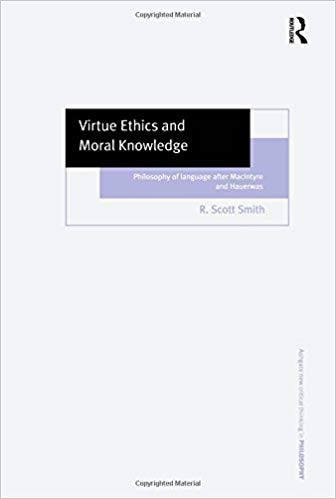 | Virtue Ethics and Moral Knowledge: Philosophy of Language after MacIntyre and Hauerwas by R. Scott Smith Routledge; 1 edition (May 18, 2017) 240 pages. We live in a time of moral confusion: many believe there are no overarching moral norms, and we have lost an accepted body of moral knowledge. Alasdair MacIntyre addresses this problem in his much-heralded restatement of Aristotelian and Thomistic virtue ethics; Stanley Hauerwas does so through his highly influential work in Christian ethics. Both recast virtue ethics in light of their interpretations of the later Wittgenstein's views of language. This book systematically assesses the underlying presuppositions of MacIntyre and Hauerwas, finding that their attempts to secure moral knowledge and restate virtue ethics, both philosophical and theological, fail. Scott Smith proposes alternative indications as to how we can secure moral knowledge, and how we should proceed in virtue ethics. |
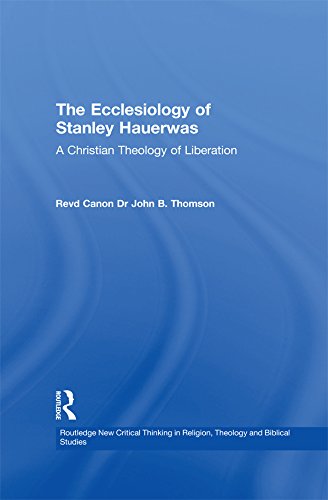 | The Ecclesiology of Stanley Hauerwas: A Christian Theology of Liberation (Routledge New Critical Thinking in Religion, Theology and Biblical Studies) by John B. Thompson Routledge; 1 edition (March 1, 2017). 256 pages. This book presents the theological work of Stanley Hauerwas as a distinctive kind of 'liberation theology'. John Thomson offers an original construal of this diffuse, controversial, yet highly significant modern theologian and ethicist. Organising Hauerwas' corpus in terms of the focal concept of liberation, Thomson shows that it possesses a greater degree of coherence than its usual expression in ad hoc essays or sermons. John Thomson locates Hauerwas in relation to a wide range of figures, including the obvious choices - Rauschenbusch, Niebuhr, Barth, Yoder, Lindbeck, MacIntyre, Milbank and O'Donovan - as well as less expected figures such as Gadamer, Habermas, Ricoeur, Pannenberg, Moltmann, and Hardy. Providing a structured and rigorous outline of Hauerwas' intellectual roots, this book presents an account of his theological project that demonstrates an underlying consistency in his attempt to create a political understanding of Christian freedom, reaching beyond the limitations of the liberal post-enlightenment tradition. Hauerwas is passionate about the importance of moral discourse within the Christian community and its implications for the Church's politics. When the Church is often perceived to be in decline and an irrelevance, Hauerwas proffers a way of recovering identity, confidence and mission, particularly for ordinary Christians and ordinary churches. Thomson evaluates the comparative strengths and weaknesses of Hauerwas' argument and indicates a number of vulnerabilities in his project. |
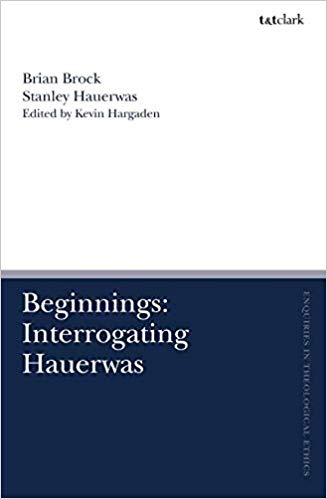 | Beginnings: Interrogating Hauerwas by Brian Brock (Author), Stanley Hauerwas (Author), Kevin Hargaden (Editor) T&T Clark (February 9, 2017). 366 pages. Stanley Hauerwas is arguably the most well-known figure in theological ethics of the last generation. Having published voluminously over the last 30 years, late in his career he has also published two volumes of essays discussing his corpus retrospectively, as well as a widely acclaimed memoir. The sheer volume of his work can be daunting to readers, and it is easy to get the impression that his retrospective volumes are restating positions developed earlier. Brian Brock delves into Hauerwas' formation as a theologian at Yale, his first book, Character and the Christian Life, and examines some of his early, and outspoken, criticisms of the guild of Christian ethics. This chapter is followed by a discussion of his memoir, Hannah's Child, and raises tricky questions about the role of autobiography in Christian ethics, as well as the troubling problem of race in the modern academy. Brock explores Hauerwas' work on disability, his criticisms of the discipline of medical ethics, and the role played by vulnerability in his work. The next chapter examines his views on just war and pacifism, here probing the sensitive issue of the role of gender in his work, and leading into a discussion on the nature of the church's peaceable politics, in which his supposed hyper-ecclesiocentricism is examined. Brock examines the role of virtue in Hauerwas' thought, and teases out why he hates to be called a virtue ethicist. A final chapter asks him to respond to the recently levelled criticism that scripture does no work in his theology, focusing especially on his under-appreciated commentary on the gospel of Matthew. The editor of this volume has managed to maneuver Hauerwas into positions where he has directly faced tricky questions that he normally does not discuss, such as the accusation that he is racist, too soft on Yoder, or misogynist. |
 | For the Life of the World: Jesus Christ and the Church in the Theologies of Dietrich Bonhoeffer and Stanley Hauerwas by Robert J. Dean. Pickwick Publications (May 13, 2016). 302 pages. What is the church? What is its mission in the world? Modern Protestantism's inability to provide a clear answer to these seemingly simple questions has resulted in vast confusion amongst pastors about the nature of their calling and has left congregations languishing without a clear reason for existence. Many of the voices and allegiances competing for the churches' attention have rushed in to fill the void, with the result that the church in modernity has frequently found itself captive to the prevailing culture. Yet from within the belly of highly culturally accommodated churches, both the German nepastor-theologian Dietrich Bonhoeffer and the American theological ethicist Stanley Hauerwas were able to articulate compelling visions of churches freed from their cultural captivity in order to truly and freely serve God and neighbor. Against the complex and confusing backdrops of Nazi Germany and late twentieth- and early twenty-first-century America respectively, Bonhoeffer and Hauerwas sought to recover the ethical and political character of the Christian faith through recalling the church back to the christological center of its faith. Together they provide a rich set of complementary, and at times mutually correcting, resources for the contemporary church as it seeks to faithfully bear witness to Christ amidst the ruins of Christendom. |
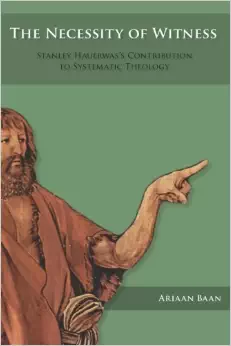 | The Necessity of Witness: Stanley Hauerwas's Contribution to Systematic Theology by Ariaan W. Baan. Pickwick Publications (August 17, 2015). 246 pages. The role of witness is a recurring theme in the work of Stanley Hauerwas: it is through enacting the truth in a world of lies, through seeking peace in a world of violence, that witnesses show who God is, who we are, and what the world is like. The Necessity of Witness is a study of Hauerwas and his fascinating but complex understanding of witness. Ariaan W. Baan argues that Hauerwas's approach makes a significant contribution to current debates in systematic theology on the relation between truth and life. Reading Hauerwas can be a precarious adventure. His rhetoric is overwhelming, but his argument is not always crystal clear and carefully formulated. With the help of semiotic and philosophical analysis and biblical exegesis, Baan articulates Hauerwas's intuitions, fills some of the gaps in his argumentation, and discloses hidden biases. The results of this analysis sometimes surprise. Baan notes that unexpected pericopes in Scripture such as Isaiah and Revelation support Hauerwas's account of witness, and concludes that his work offers insight into how in our late modern society such diverse groups as martyrs and pop stars offer implicit witness through their lives. |
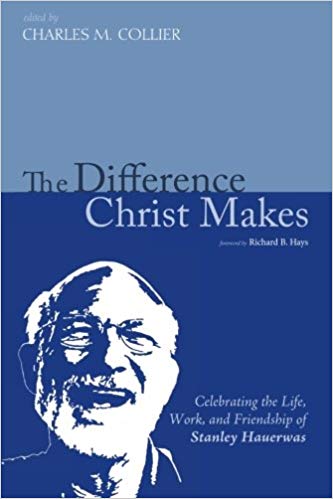 | The Difference Christ Makes by Charlie M. Collier Wipf and Stock (January 7, 2015). 114 pages. "The papers and responses in this volume were delivered, fittingly, on All Saints Day, 2013, as part of a day-long event to celebrate the career of Stanley Hauerwas, upon the occasion of his retirement from the faculty of Duke Divinity School. . . . [T]he central message of the day was encapsulated in the theme of the whole event: ""The Difference Christ Makes."" As the different speakers talked about Stanley's paradigm-changing impact on scholarship, one insight came ever more clearly into focus: the deepest theme of Stanley's work, the consistent thread running through all his thought, is his emphasis on the centrality of Jesus Christ. At the end of the day, his work is not defined by the ethics of character, or by pacifism, or by countercultural communitarian ecclesiology. All these elements play important roles in his writings, but they are reflexes or consequences of his more fundamental commitment to think rigorously about the implications of confessing Jesus Christ as Lord."" --from the foreword by Richard B. Hays |
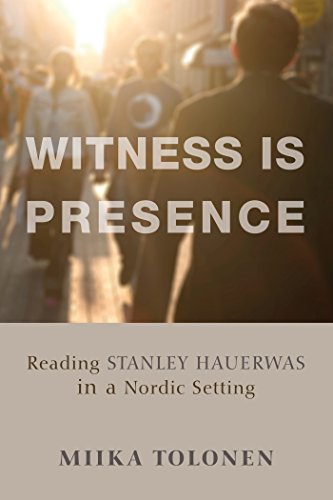 | Witness Is Presence: Reading Stanley Hauerwas in a Nordic Setting by Miika Tolonen Resource Publications (January 7, 2014). 200 pages. In a postsecular cultural situation the conditions for understanding and communicating a Christian tradition have changed. None of the established religions can any longer claim monopoly in the "marketplace of religions" A claim of this study is that a postsecular situation characterized, among other things, by dwindling memberships in established churches as well as a new visibility of alternative religious expressions, opens up a need to reflect on alternative ways of understanding Christianity in its context. This study focuses on the question, how can a Christian tradition be communicated understandably in a postsecular context? In traditional terms: how can Christian witness be understood in our situation? It is to this need, according to this study, that the ecclesiology of Stanley Hauerwas provides a meaningful perspective. This perspective becomes relevant because in a postsecular context a Christian church, even a folk church, cannot assume to be in a position of majority or power. There is, therefore, a need to ask how to understand Christianity as a community of witness that is neither in power nor a majority. The study suggests that embodiment of Christian convictions becomes a central factor in a meaningful postsecular notion of witness. |
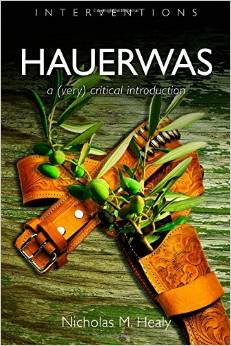 | Hauerwas: A (Very) Critical Introduction by Nicholas M. Healey. by Nicholas M. Healy. Eerdmans (March 14, 2014). 160 pages. Stanley Hauerwas is one of the most important and robustly creative theologians of our time, and his work is well known and much admired. But Nicholas Healy -- himself an admirer of Hauerwas’s thought -- believes that it has not yet been subjected to the kind of sustained critical analysis that is warranted by such a significant and influential Christian thinker. As someone interested in the broader systematic-theological implications of Hauerwas’s work, Healy fills that gap in Hauerwas: A (Very) Critical Introduction. After a general introduction to Hauerwas’s work, Healy examines three main areas of his thought: his method, his social theory, and his theology. According to Healy, Hauerwas’s overriding concern for ethics and church-based apologetics so dominates his thinking that he systematically distorts Christian doctrine. Healy illustrates what he sees as the deficiencies of Hauerwas’s theology and argues that it needs substantial revision. Reviews
|
